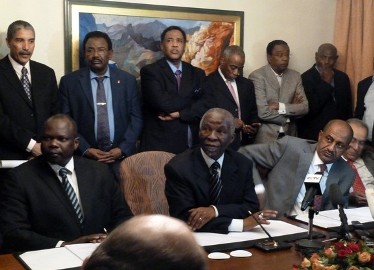Sudan and South Sudan to resume talks on 29 May
May 24, 2012 (KHARTOUM) — Delegations from Sudan and South Sudan are expected to resume talks on Tuesday in Addis Ababa over the disputed issues, Sudan Tribune has learnt.

Mbeki announced that the parties will resume discussions next week without further details on the positions of the two countries or what they are going to talk about. While Khartoum repeats security issues should be first, Juba rejects attaching any conditions to resuming negotiations.
Sources close to the file, told Sudan Tribune that delegations, headed by defense and interior ministers from the two countries, will meet at the level of the Joint Political and Security Mechanism (JPSM) in Addis Ababa on Tuesday 29 May.
The meeting, which will discuss the implementation of security agreements the parties have already signed, will be attended also by the directors of the intelligence services from both sides.
In its communiqué of 24 April, the AU Peace and Security Council (AUPSC) deplored the failure of the two parties to enforce a number of deals they signed on the administration and security of Abyei and the monitoring of border between the two countries.
The AUPSC cited the “Temporary Arrangements for the Administration and Security of the Abyei Area of 20 June 2011, the Agreement on Border Security and the Joint Political and Security Mechanism (JPSM) of 29 June 2011, the Agreement on the Border Monitoring Support Mission of 30 July 2011, the decisions of the JPSM of 18 September 2011, the Memorandum of Understanding (MoU) on Non-Aggression and Cooperation of 10 February 2012.”
The African body also demanded the activation of an ad hoc committee, under the JPSM, to investigate violations of border agreements.
In its 24 April resolution the AUPSC demanded the mediation, among others, to convene a meeting of the JPSM to discuss security issues “in order to ease the current tension, facilitate the resumption of negotiations on post-secession relations and the normalization of their relations.”
The sources said the African mediation in agreement with the JPSM members might decide to send a verification team to consider the establishment of a buffer zone to separate the forces of the two countries.
Speaking to reporters after his first meeting with the Sudanese president on 20 May, Mbeki said that Bashir reiterated his commitment to the buffer zone.
“This means Sudan is committed to have a buffer zone on the border between the two states, 10 kilometers on each side, and also Sudan is committed to have a joint mechanism for monitoring the border and the buffer zone,” he said.
The eruption of South Kordofan conflict in June 2011, between the Sudan People’s Liberation Movement-North (SPLM-N) and the Sudanese army added a new difference among the two countries.
Khartoum accuses Juba of supporting the SPLM-N and Darfur rebels who formed an alliance (Sudan Revolutionary Front) aiming to topple the regime of the National Congress Party. But Juba denies this and accuses the Sudanese government of backing rebel militias.
SPLM Secretary General, Pagan Amum, who is also Juba’s top negotiator, welcomed the resumption of talks and further accused Khartoum and the African mediation of violating the roadmap adopted by the United Nations Security Council in its decision of 2 May.
“Though the Panel has violated the roadmap; the government of Sudan has violated the roadmap. The Government of Sudan and the Panel are both responsible for not complying with the timeline of calling the two countries immediately before the deadline of seventeenth May,” He said in a statement to Radio Miraya.
The two parties, in accordance with the resolution 2046, had to start talks within two weeks of the UNSC resolution of 2 May.
(ST)
